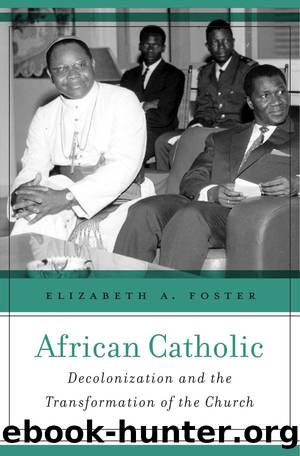African Catholic by Elizabeth A. Foster

Author:Elizabeth A. Foster
Language: eng
Format: epub
Publisher: Harvard University Press
African priests who publicly examined and defended Catholicism in the postwar period were often simultaneously critical and celebratory of the church. These men, whose clerical commitments made them perhaps even more personally invested in their faith than passionate laymen such as Alioune Diop or Joseph Ki-Zerbo, were eager to define Catholicism in a way that they could square with their experience as black men, though it was not always easy for them to do so. In a presentation on âTheology and African cultureâ at Alioune Diopâs Second Congress of Black Writers and Artists in Rome in 1959, Father Robert Sastre, who served for a time as a chaplain for colonial students in Paris and editor of Tam-Tam alongside Father Joseph Michel and then later became bishop of Lokossa, Benin, explained this dilemma.120 Acknowledging the profound tensions between his priestly vocation and his forays as a black intellectual, Sastre told his audience, âIt is veritably impossible to know how to reconcile the demands of complete and submissive faith with the lucidity of an intellectual who is probing the vicissitudes of the history of his race, to speak in front of men who do not share my faith of things that cannot be fully grasped without faith, and to expose to the faithful cracks in the theological edifice that they consider seamless and solid, and definitively constructed.â Yet, he continued, âI must face the challenge in the name of my faith and in the name of my negritude, as I am certain that both of them cannot help but grow in stature from the confrontation that I will engage in before you, and which constitutes the heart of my life as an African priest.â121 Sastre chose to see the potential dissonance between Catholicism and negritude as an opportunity for growth and discovery, rather than an impasse that undermined his faith.
Raymond-Marie Tchidimbo, ridiculed by some Spiritan superiors for his intellectual aspirations, also publicly addressed the challenges of being African in the church in the 1950s and 1960s. He relied heavily on Emmanuel Mounierâs personalism and cited the Frenchman frequently in his work, which included the article for Diopâs 1953 student issue of Présence africaine entitled âThe African Student Confronts Latin Cultureâ as well as a 1963 volume of reflections on Catholicism, Lâhomme noir dans lâÃglise, that appeared with Présence africaine.122 Like Alioune Diop and other Catholic African activists, Tchidimbo wanted to speak for a church that welcomed all. âThe Catholic Church is not the creation nor the property of the West,â he wrote, âit is the property of all good souls who wish to watch it, know it, and love it.â123 Tchidimbo called on the church to be true to its own universal values and diversify its ranks for its own sake.124 He did not shy away from critiquing missionary errors, of which he had bitter firsthand experience: their tendency to subordinate African clergy, their refusal to recognize the transient nature of their task, their failure to implement Vatican directives.125 Yet he also
Download
This site does not store any files on its server. We only index and link to content provided by other sites. Please contact the content providers to delete copyright contents if any and email us, we'll remove relevant links or contents immediately.
The Secret History by Donna Tartt(19088)
The Social Justice Warrior Handbook by Lisa De Pasquale(12190)
Thirteen Reasons Why by Jay Asher(8910)
This Is How You Lose Her by Junot Diaz(6887)
Weapons of Math Destruction by Cathy O'Neil(6280)
Zero to One by Peter Thiel(5802)
Beartown by Fredrik Backman(5754)
The Myth of the Strong Leader by Archie Brown(5508)
The Fire Next Time by James Baldwin(5446)
How Democracies Die by Steven Levitsky & Daniel Ziblatt(5219)
Promise Me, Dad by Joe Biden(5153)
Stone's Rules by Roger Stone(5088)
A Higher Loyalty: Truth, Lies, and Leadership by James Comey(4964)
100 Deadly Skills by Clint Emerson(4925)
Rise and Kill First by Ronen Bergman(4789)
Secrecy World by Jake Bernstein(4753)
The David Icke Guide to the Global Conspiracy (and how to end it) by David Icke(4720)
The Farm by Tom Rob Smith(4513)
The Doomsday Machine by Daniel Ellsberg(4490)
